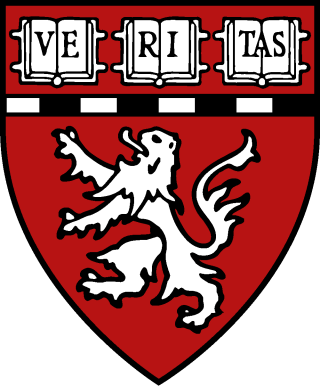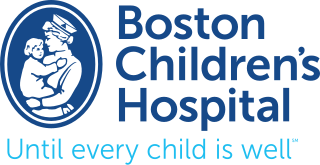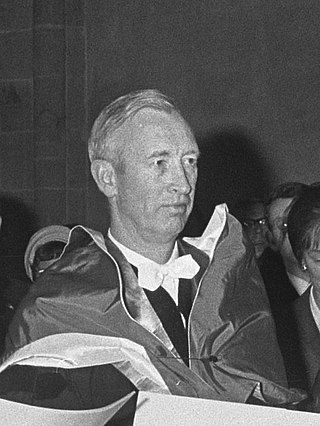
Harvard Medical School (HMS) is the graduate medical school of Harvard University and is located in the Longwood Medical Area in Boston, Massachusetts. Founded in 1782, HMS is one of the oldest medical schools in the United States. Unlike most other leading medical schools, HMS does not operate in conjunction with a single hospital but is directly affiliated with several teaching hospitals in the Boston area. Affiliated teaching hospitals and research institutes include Dana–Farber Cancer Institute, Massachusetts General Hospital, Brigham and Women's Hospital, Beth Israel Deaconess Medical Center, Boston Children's Hospital, McLean Hospital, Cambridge Health Alliance, The Baker Center for Children and Families, and Spaulding Rehabilitation Hospital.

Joseph Edward Murray was an American plastic surgeon who performed the first successful human kidney transplant on identical twins Richard and Ronald Herrick on December 23, 1954.

Massachusetts General Hospital is the original and largest teaching hospital of Harvard Medical School, Harvard University located in the West End neighborhood of Boston, Massachusetts. Massachusetts General Hospital houses the world's largest hospital-based research program, the Mass General Research Institute, with an annual research budget of more than $1.2 billion in 2021. It is the third-oldest general hospital in the United States with a patient capacity of 999 beds. Along with Brigham and Women's Hospital, Mass General is a founding member of Mass General Brigham, formerly known as Partners HealthCare, the largest healthcare provider in Massachusetts. It is currently ranked among the best hospitals in the United States by U.S. News & World Report.


Brigham and Women's Hospital (BWH) is the second largest teaching hospital of Harvard Medical School and the largest hospital in the Longwood Medical Area in Boston, Massachusetts. Along with Massachusetts General Hospital, it is one of the two founding members of Mass General Brigham, the largest healthcare provider in Massachusetts. Robert Higgins, MD, MSHA serves as the hospital's current president.
Dana–Farber Cancer Institute is a comprehensive cancer treatment and research institution in Boston, Massachusetts. Dana–Farber is the founding member of Dana–Farber/Harvard Cancer Center, Harvard's Comprehensive Cancer Center designated by the National Cancer Institute, and one of the 15 clinical affiliates and research institutes of Harvard Medical School.

Paul Charles Zamecnik was an American scientist who played a central role in the early history of molecular biology. He was a professor of medicine at Harvard Medical School and a senior scientist at Massachusetts General Hospital. Zamecnik pioneered the in vitro synthesis of proteins and helped elucidate the way cells generate proteins. With Mahlon Hoagland he co-discovered transfer RNA (tRNA). Through his later work, he is credited as the inventor of antisense therapeutics. Throughout his career, Zamecnik earned over a dozen US patents for his therapeutic techniques. Up until his death in 2009 he maintained a lab at MGH where he studied the application of synthetic oligonucleotides for chemotherapeutic treatment of drug resistant and XDR tuberculosis in his later years.

Boston University Chobanian & Avedisian School of Medicine (CAMED), formerly known as Boston University School of Medicine, is the medical school of Boston University, a private research university in Boston. It was founded in 1848. The medical school was the first institution in the world to formally educate female physicians. Originally known as the New England Female Medical College, it was subsequently renamed Boston University School of Medicine in 1873, then Chobanian & Avedisian School of Medicine in 2022. In 1864, it became the first medical school in the United States to award an M.D. degree to an African-American woman.

Norman Geschwind was a pioneering American behavioral neurologist, best known for his exploration of behavioral neurology through disconnection models based on lesion analysis.

Tufts Medical Center, a 15-building campus located in Boston, Massachusetts, is a downtown Boston hospital midway between Chinatown and the Boston Theater District.
Joseph Biederman was Chief of the Clinical and Research Programs in Pediatric Psychopharmacology and Adult ADHD at the Massachusetts General Hospital, professor of psychiatry at Harvard Medical School. Biederman was Board Certified in General and Child Psychiatry.
Michael Shannon was an American pediatric toxicologist who specialized in the effect of toxins and poisonous substances in children. A dancer since his days in college, Shannon was known as the "dancing doctor".

George Quentin Daley is the Dean of the Faculty of Medicine, Caroline Shields Walker Professor of Medicine, and Professor of Biological Chemistry and Molecular Pharmacology at Harvard Medical School. He was formerly the Robert A. Stranahan Professor of Pediatrics at Harvard Medical School, Director of the Stem Cell Transplantation Program at Boston Children's Hospital, and an investigator of the Howard Hughes Medical Institute, Associate Director of Children's Stem Cell Program, a member of the Executive Committee of the Harvard Stem Cell Institute. He is a past president of the International Society for Stem Cell Research (2007–2008).
Laurie Hollis Glimcher is an American physician-scientist who was appointed president and CEO of Dana–Farber Cancer Institute in October 2016. She was elected a Member of the American Philosophical Society in 2019.

Michael R. Hayden, is a Killam Professor of Medical Genetics at the University of British Columbia, the highest honour UBC can confer on any faculty member. Only four such awards have ever been conferred in the Faculty of Medicine. Dr. Hayden is also Canada Research Chair in Human Genetics and Molecular Medicine. Hayden is best known for his research in Huntington disease (HD).

Jonathan Scott Lavine is an American business executive serving as co-managing partner of Bain Capital, and chief investment officer of Bain Capital Credit, which he founded in 1997 as Sankaty Advisors, a division of Bain Capital. Lavine is also a philanthropist who donated to several U.S. organizations. He is the co-chair of the Board of Trustees of Columbia University.

Ashish Kumar Jha is an Indian-American general internist physician and academic who served as the White House COVID-19 Response Coordinator from 2022-2023. He has been Dean of the Brown University School of Public Health since 2020. Prior to Brown, he was the K.T. Li Professor of Global Health at Harvard T.H. Chan School of Public Health, faculty director of the Harvard Global Health Institute, and a Senior Advisor at Albright Stonebridge Group. Jha is recognized as one of the leading health policy scholars in the nation. Jha's role at Brown University focuses on improving the quality and cost of health care, and on the impact of public health policy.
Patricia Kilroy Donahoe is an American pediatric surgeon and a leading researcher in the field of developmental biology and oncology. She was the president of the American Pediatric Surgical Association from 2006 to 2007. She currently serves as the director of pediatric surgical research laboratories and chief emerita of pediatric surgical services at Massachusetts General Hospital.
Wendy Ross is an American developmental and behavioral pediatrician with a specific focus on autism. Ross founded Autism Inclusion Resources, a non-profit organization to help children with autism participate in everyday activities in their communities. Currently, Ross serves as the director of the new Center for Autism and Neurodiversity at Jefferson Health and Thomas Jefferson University.
Mark Schuster is the Founding Dean and CEO of the Kaiser Permanente Bernard J. Tyson School of Medicine located in Pasadena, California. Schuster assumed his position in 2017, and the school opened in July 2020. Schuster is a physician-scientist known for his work on child, adolescent, and family health.












